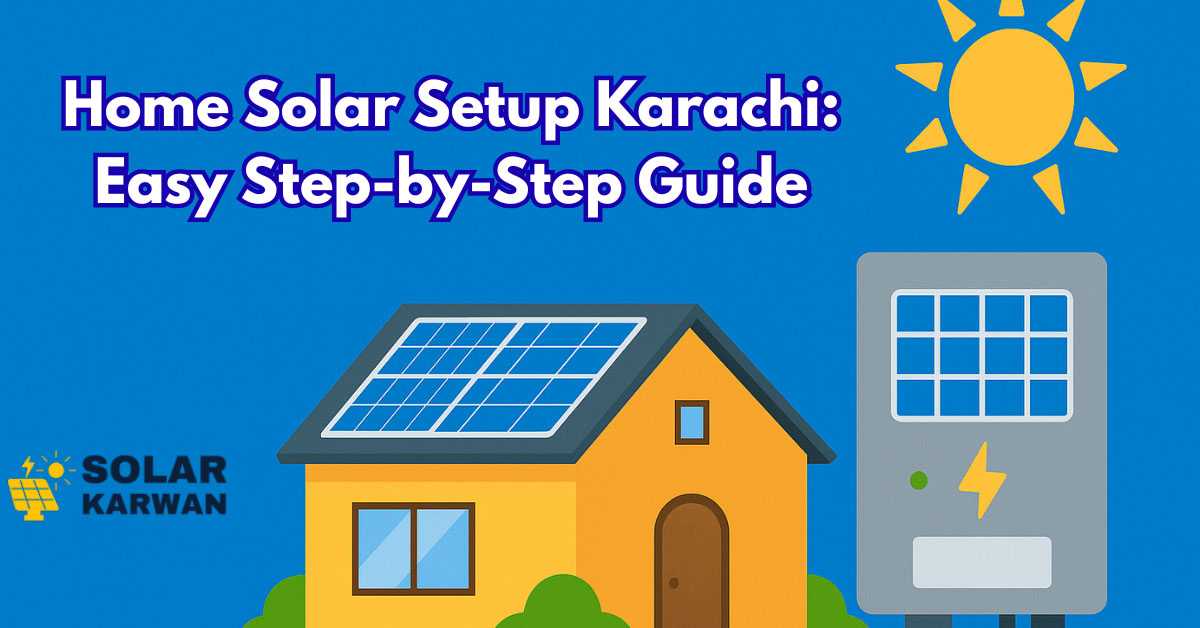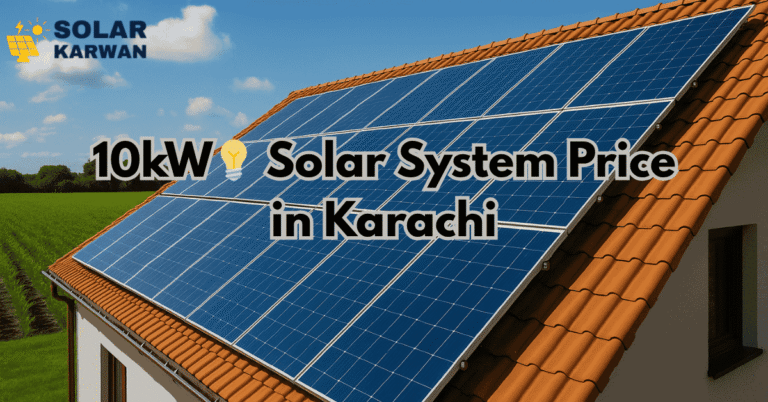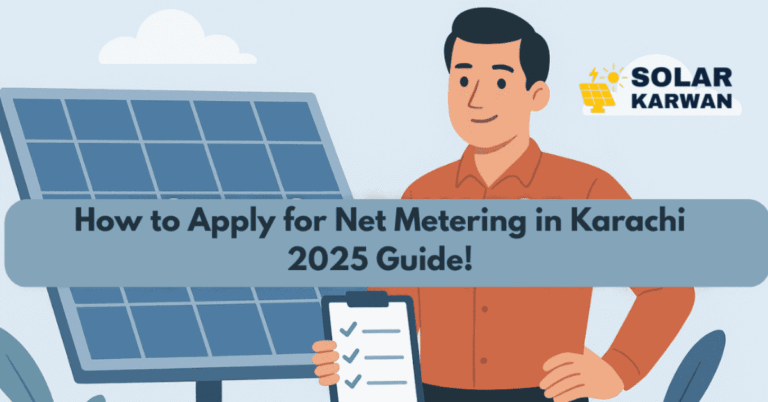Thinking about installing a solar system at home in Karachi? You’re in the right place.
This easy guide will walk you through every step: what you need, how to set it up, and what to expect. For a full breakdown of system types, costs, and how net metering works, check out our Karachi Solar Guide.
No technical talk, just helpful tips for Karachi homeowners who want to go solar.
Assess Your Energy Needs

Before installing a solar system, it is essential to understand how much electricity your home consumes daily. Every appliance in your house adds up to your total power consumption.
Knowing this helps you determine the right size of solar system you need.
If you install a system that’s too small, it won’t cover your needs. If it’s too big, you might spend more than necessary.
🧾 Here’s a simple breakdown to help you estimate your daily power use:
| Appliance | Average Power (W) | Daily Usage (hrs) | Total Consumption (Wh/Day) |
|---|---|---|---|
| Fan | 80 | 10 | 800 |
| Refrigeretor | 150 | 24 | 3600 |
| LED lights (x5) | 10 | 6 | 300 |
| Wi-Fi Router | 10 | 24 | 240 |
| Washing Machine | 500 | 0.5 | 250 |
| Total | – | – | 5190(Wh/Day) |
Once you have a rough idea of your daily energy usage, you’ll be able to choose the right solar system size for your home. You can also use our free solar consumption calculator.
This first step helps avoid overspending and ensures your system fits your needs.
Check Your Rooftop or Available Space

Now that you know how much energy you need, the next step is to see if your rooftop or available space is ready for solar panels.
Your system needs good sunlight and a strong, open surface to work properly. Flat rooftops work great, and south-facing ones are ideal for maximum sunlight in Karachi.
Also, check for these things
- No major shade from trees or buildings
- Solid structure that can hold panel weight
- Enough open space (even small homes can work!)
Here’s a simple way to check if your roof is solar-ready based on common roof types and conditions in Karachi:
| Checkpoints | What to Look for |
|---|---|
| Sunlight hours | At least 5–6 hours of direct sunlight on your roof daily. |
| Shade Obstacles | No large trees, buildings, or water tanks blocking sunlight during 10 AM–3 PM. |
| Available Area | Minimum 20–25 sq. ft. per panel; 250–300 sq. ft. for a standard 5kW system. |
| Roof Condition | Flat and stable structure with no leakage or severe cracks. |
| Expert Support | Contact Solar Karwan for a free rooftop inspection and system suggestion. |
If your roof checks most of these boxes, you’re already one step closer to going solar.
However, even if you’re unsure, don’t worry, our team at Solar Karwan can help assess your space and guide you towards the best setup for your home.
Choose the Right Type of System

Every home is different, so choosing the right type of solar system matters. In Karachi, you’ll mostly find three types: on-grid, off-grid, and hybrid.
Not sure if you need an on-grid, off-grid, or hybrid system? Our Karachi Solar Guide breaks down each type with pros, cons, and pricing so you can choose what suits your home best.
Here’s a quick breakdown to understand the three types better:
- On-Grid System: This works directly with K-Electric. It helps reduce your electricity bill by feeding extra power back to the grid, but it doesn’t provide backup during loadshedding.
- Off-Grid System: This one doesn’t rely on the grid at all. It uses batteries to store solar power and is perfect for areas with frequent power outages or no connection to K-Electric.
- Hybrid System: A mix of both on-grid and off-grid. You save on bills and also have backup when the power goes out. It’s the most flexible option for Karachi homes.
Let’s break it down even further in the table below:
| System Type | Connected to K-Electric | Need Batteries | Works During Loadshedding | Best For |
|---|---|---|---|---|
| On-Grid | Yes | No | No | Reducing bills with a stable KE supply |
| Off-Grid | No | Yes | Yes | Areas with no grid or frequent power cuts |
| Hybrid | Yes | Yes | Yes | Homes needing both savings and backup |
Choosing the right system isn’t just about what sounds best—it’s about what fits your lifestyle and location.
If you’re still unsure, our team at Solar Karwan can guide you through the decision based on your budget, energy goals, and backup needs.
Set Your Budget

Thinking about costs early can help you avoid surprises later. Your solar budget isn’t just about the panels; it includes the inverter, batteries (if needed), wiring, and professional installation.
Additionally, if you’re going for net metering, that will also add to the upfront cost
For instance, a 5kW hybrid setup with net metering will cost more than a basic off-grid system, but the long-term savings and stability are often worth it.
Be sure to consider system type, equipment quality, and warranty while planning your expenses.
Here’s a quick comparison of typical system prices in Karachi:
| System Size | With Net-Metering | Without Net-Metering |
|---|---|---|
| 3kW | Rs. 525,000 – Rs. 565,000 | Rs. 480,000 – Rs. 510,000 |
| 5kW | Rs. 730,000 – Rs. 790,000 | Rs. 670,000 – Rs. 720,000 |
| 10kW | Rs. 1,320,000 – Rs. 1,450,000 | Rs. 1,200,000 – Rs. 1,320,000 |
Setting a realistic budget early helps narrow your options and avoid delays. Once you know what you can spend, it’s easier to plan the next steps.
Choose a Trusted Solar Installer

Finding the right installer is just as important as choosing the right solar system.
A good installer will not only handle the setup professionally but also guide you through the entire process, including paperwork and post-installation support.
In Karachi, there are many solar companies, but not all of them are certified or experienced.
Here’s a quick comparison to help you spot the difference:
| Criteria | Trusted Installer | Inexperienced Installer |
|---|---|---|
| Certification | PEC/ARE-certified team | No clear credentials |
| Site Survey | Detailed and free | Rushed or skipped |
| Equipment Quality | Tier 1 panels & branded inverters | Unverified or cheap brands |
| Warranty | 10–25 years (depending) | Short or unclear warranties |
| After-Sales Support | Dedicated helpline and service | No clear support or follow-up |
Choosing Solar Karwan means you’re choosing a certified team that values honesty and long-term results.
Our engineers offer personalized guidance and ensure your home’s solar system is safe, optimized, and ready for the long run.
Get the Net Metering Process Started

Now that your installer is on board, it’s time to apply for net metering.
This step allows you to connect your solar system to the K-Electric grid so that you can sell back any extra electricity your system produces and earn credits on your bill.
Need more clarity on how Net Metering works? Our Karachi Solar Guide covers the full process and benefits in detail.
To get started with net metering in Karachi, your installer will typically handle:
- Form submission to NEPRA and K-Electric
- System inspection and technical checks
- Bi-directional meter installation
- Final approval & activation
The Net Metering process in Karachi follows a simple step-by-step system. From applying to turning your system on, each stage is handled with support from your installer.
👇Here’s a quick breakdown of how it works:
Step 1: Your solar installer submits the net metering application to K-Electric and NEPRA.
Step 2: K-Electric visits your home to inspect the system and ensure it meets requirements
Step 3: A bi-directional meter is installed to track how much electricity you send back to the grid.
Step 4: NEPRA gives the final go-ahead with an approval certificate.
Step 5: Your solar system is now officially net-metered and ready to reduce your bills.
The process might sound technical, but Solar Karwan will guide you through all the steps so you don’t have to worry. You just sit back and watch your bills drop.
Installation & Inspection

Once everything is approved, it’s time for the actual setup. Your installer will bring all the equipment, like solar panels, an inverter, mounting structures, wiring, and begin the installation.
Most residential systems in Karachi are installed within 2–3 days, depending on the complexity and weather conditions.
After installation, a thorough inspection is carried out. This ensures that everything is properly connected, safe, and in line with the rules set by NEPRA and K-Electric.
The inspection also helps confirm that your system is ready for activation and net metering.
Quick Note: Your installer will usually handle the coordination with K-Electric for this inspection. You just need to make sure your rooftop and access points are clear on the day of installation
System Activation & Monitoring

After passing inspection and getting final approvals, your solar system is officially switched on.
From this point, you start generating clean electricity directly from your rooftop.
Most modern solar inverters come with monitoring apps. These let you track:
- How much power is your system producing
- How much do you use from the grid or solar
- Your real-time savings
This data helps you stay in control and get the most out of your system. Some apps also send you alerts if anything goes wrong, so you can fix it before it becomes a problem.
Tip: Ask your installer to help set up the app on your phone during activation. It’s usually free and takes just a few minutes.
Start Your Solar Journey with Confidence

If you’ve made it this far, you’re probably serious about going solar. But if you’re still deciding, take a step back and read our quick post: 5 Signs You’re Ready to Go Solar in Karachi.
Going solar in Karachi doesn’t have to be confusing. With the right planning, support, and a trusted installer, you can power your home with reliable energy and say goodbye to rising bills for good.
Ready to make the switch?
Solar Karwan is here to guide you at every step—honest advice, smooth process, and real savings.
Solar Karwan-Roshan Kal Ka Safar!!!
FAQs

1) How long does it take to install a solar system in Karachi?
It usually takes 1–2 days for the system to be installed. Net metering approval from K-Electric and NEPRA may take 2–4 weeks.
2)Do I need permission from my society or apartment management?
Yes, if you live in a housing society or apartment building, it’s a good idea to get formal approval—especially for rooftop access or structural modifications.
3)Is net metering available for everyone in Karachi?
Most homes with a 3-phase connection from K-Electric can apply for net metering. If you have a single-phase connection, you may need to upgrade first.
4)What happens if my solar system produces more electricity than I use?
Your extra units are sent back to the grid. K-Electric credits those units to your next bill—this is what helps you save even more!
5)How do I track the performance of my solar system?
Modern inverters come with apps that show you real-time power production, consumption, and overall savings—right from your smartphone.
6)Where can I find a reliable solar installer in Karachi?
Choosing the right installer is key to a safe and efficient solar setup. Look for certified professionals. At Solar Karwan, we offer expert consultation, certified electrical engineers, and complete solar solutions tailored to your home.
Ready to get started? Just give us a call at 📞 +92-324-2214498 — we’ll guide you every step of the way!





